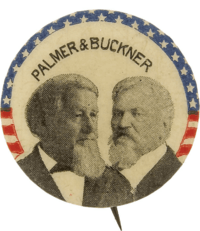National Democratic Party (United States) facts for kids
Quick facts for kids
National Democratic Party
|
|
|---|---|

John M. Palmer/Simon B. Buckner campaign button (1896)
|
|
| Leaders | John M. Palmer William F. Vilas Grover Cleveland Simon B. Buckner |
| Founded | 1896 |
| Dissolved | 1900 |
| Split from | Democratic Party |
| Preceded by | Bourbon faction of the Democratic Party |
| Merged into | Democratic Party |
| Ideology | Anti-imperialism Free trade Liberalism Classical liberalism Economic liberalism Social liberalism Pro-gold standard Progressivism |
| Political position | Center-right |
| National affiliation | Democratic Party |
| Colors | Gold |
The National Democratic Party, also known as Gold Democrats, was a political party that existed for a short time. It was formed by a group of Democrats who disagreed with their party's main candidate, William Jennings Bryan, in the 1896 presidential election.
These Democrats, often called "Bourbon Democrats," greatly admired President Grover Cleveland. They believed Bryan's idea of "free silver" would harm the country's economy. Instead, they chose their own candidates: John M. Palmer for president and Simon B. Buckner for vice president. Palmer was a former governor and Union general, while Buckner was a former governor and Confederate general.
The party also supported a few candidates for other government jobs, like Congress.
Contents
Why the Party Formed
The people who started the National Democratic Party were unhappy with the direction the main Democratic Party was taking. They wanted to keep the original ideas of important figures like Thomas Jefferson and Andrew Jackson. They felt the main Democratic Party had left these ideas behind by choosing Bryan as their candidate.
What They Believed In
The National Democratic Party believed strongly in individual freedom. They thought that everyone, if not held back by laws, could find their own happiness. They supported the right to speak freely, think freely, and trade freely. They also believed in the idea of "individual liberty."
The party was against policies that would cause prices to rise too much (inflation). They also opposed high taxes on imported goods (protectionism), which was a policy supported by the Republican Party.
Who Supported Them
Many well-known thinkers and leaders who believed in classical liberalism (a type of political idea that focuses on individual rights and limited government) supported this new party. These included President Grover Cleveland and famous writers and business leaders.
Some supporters of the National Democratic Party became very famous later on. For example, Moorfield Storey became the first president of the National Association for the Advancement of Colored People (NAACP). Other important figures like Louis Brandeis and Woodrow Wilson, who later became known for their progressive ideas, also supported them.
Election Results and End of the Party
Even though many of their supporters voted for the Republican candidate, William McKinley, the National Democratic Party still received about 137,000 votes in the 1896 election. This was about 1% of all the votes.
After McKinley won, some members of the Gold Democrats hoped their party would take over the main Democratic Party. However, William Jennings Bryan and his supporters kept control of the Democratic Party for a long time. Bryan was nominated for president again in 1900 and 1908. Later, modern liberal leaders like Woodrow Wilson and Franklin D. Roosevelt would put many of Bryan's ideas into law.
After not doing well in the 1898 elections, the leaders of the National Democratic Party decided to close it down in 1900. Most of its members went back to the main Democratic Party. They did this because they disagreed with President McKinley's foreign policy, which they saw as too focused on taking over other countries (imperialism).
What They Stood For
The National Democratic Party officially shared their beliefs at a meeting in Indianapolis, Indiana, on September 3, 1896. They wanted to protect the honor and well-being of the American people. They believed in fairness for everyone, no matter their background. They also supported the greatest possible freedom for individuals, as long as it worked with good government.
They wanted the federal government to stay strong and follow the Constitution. They also believed in keeping the country's money stable and valuable, often by supporting the gold standard. They were against the government controlling too much of people's lives or creating laws that favored certain groups.
The party criticized the main Democratic Party's ideas from their meeting in Chicago. They felt these ideas attacked individual freedom and the right to make private agreements. They also believed these ideas threatened the independence of judges and the President's power to enforce laws. They were especially worried about the plan to increase the price of silver through new laws, which they thought would make the country's money less valuable.
The National Democratic Party believed that the problems in the country were partly caused by the Republican Party's laws, which they felt favored certain groups and led to unfair taxes.

